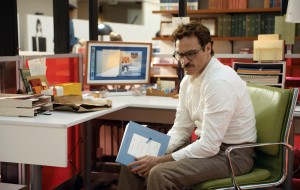First he took us into the mind of John Malkovich. Then he worked with the anxious writing process of Charlie Kaufman before sailing off to find where the “Wild Things” were. Whatever the project is, Spike Jonze has always seemed to warp reality to suit his needs. Now he’s at it again as writer and director with “Her” (released widely Jan. 10), a romantic dramedy with a science fiction twist about a relationship that defies all normal boundaries of convention. Chock full of wonderful performances from an all-star cast, a solid soundtrack and eye-popping cinematography, the movie affirms Jonze’s place (right next to Wes Anderson) as one of Hollywood’s masters of quirk and charm.

In the near future, Theodore Twombly (Joaquin Phoenix), an unsociable, mustachioed and melancholy wearer of colorful shirts, writes love letters of unfathomable beauty for a living. However, his own life doesn’t reflect the pathos in his work due to his estrangement from his wife and childhood sweetheart Catherine (Rooney Mara). She is mostly seen through silent flashbacks that hold more of an emotional punch than you’d think. As Twombly, Phoenix completely becomes the role, giving a heartbreaking performance as a decent guy down on his luck, feeling alone in the world; he’s like a futuristic, awkward Woody Allen type. It’s a complete about-face from his portrayal of the volatile Freddie Quill in Paul Thomas Anderson’s “The Master.”
Unable to cope with his loneliness and sick of calling hilariously perverse sex hotlines, Theodore purchases an artificially intelligent operating system that is designed to grow intellectually with each passing day. If Hal 9000 had a hot sister, it would be this OS, which chooses the name Samantha. The system is voiced by Scarlett Johansson (she replaced Samantha Morton) who gives a surprisingly tender performance considering that she plays a disembodied voice; yes, the Siri comparisons are endless!
Eventually, human and machine begin to fall in love with each other. This causes the plot to take a turn for the weird. If you ever wondered what it was like to have sex with your computer, this movie might serve as a helpful guide. Still, it also has a certain appeal and imaginative flare that have characterized other movies about inanimate objects coming to life such as “Lars and the Real Girl” and “Ruby Sparks.” The chemistry between Johansson’s crooning vocalizations and Phoenix’s shy teenage demeanor is electric . You can’t help but smile as they share intimate moments together (many of them wordless), separated by nothing more than a corporeal barrier, packing more meaning into a simple pronoun than you’d ever think possible.
Despite being a little pretentious at times, there’s a reason that Jonze’s script won best screenplay at the Golden Globe Awards. It’s a heartfelt character study that is smart, funny and borderline philosophical as he raises profound questions about human consciousness and how we relate to one another. Despite the presence of A-list celebrities like Olivia Wilde and Amy Adams, it seems that Jonze was able to maintain an overall indie vibe with this latest picture. It’s quieter than a blockbuster, yet more intriguing and meatier than an artsy endeavor.
While taking place in Los Angeles, parts of the movie were filmed in Shanghai to achieve a more modern and futuristic look; Hoyte van Hoytema’s cinematography treats us to beautifully lit panoramic views of the cityscape from Theodore’s apartment. Still, most of the sets are minimalistic, only hinting at a larger, more expansive world. Rather than letting the sci-fi aspect take control, it’s all about the characters. Fortunately, the movie only introduces a small amount of them. There is Theodore’s enthusiastic co-worker Paul (Chris Pratt) and his longtime friend Amy, played by Amy Adams, who shows a lot more restraint in both wardrobe and performance than she does in “American Hustle.” Even Olivia Wilde relishes in a small role as a drunken blind date.
As “Her” moves along over its two hour running time, the subtle electronic soundtrack by Arcade Fire and others serves only to enhance the overall product. What stand out are the bewitching piano pieces that Samantha composes in order to capture special moments with Theodore, in lieu of the photographs they are unable to take together.
My only criticism of the movie is its pacing. At times, it can be incredibly slow as Jonze indulges in sad shots of Twombly lying in bed, wandering sullenly in the streets or trudging through snow. Like “The Return of The King” it also has a lot of false endings. Personally, I think that there were a lot of wasted chances to end “Her” on a better, more meaningful note. Nevertheless, what is most impressive is the director’s vision of the future. It’s not the bleak, impersonal futures found in a Philip K. Dick novel or Spielberg’s Kubrickian “A.I.” On the contrary, Jonze’s perspective is optimistic and fun, full of bright lights, carnivals and foul-mouthed video game characters. Unlike replicants or terminators, the OS’s are benevolent entities, interested in discovering more about the mysteries of the universe than enacting vengeance on their creators. As “Pleasantville” assured us that change isn’t such a bad thing after all, “Her” helps to quell our modern fears of alienation in a world where technology is becoming more and more omnipresent. Through a story about a lifeless machine, Jonze pulls apart the wires and programming to reveal our humanity.

